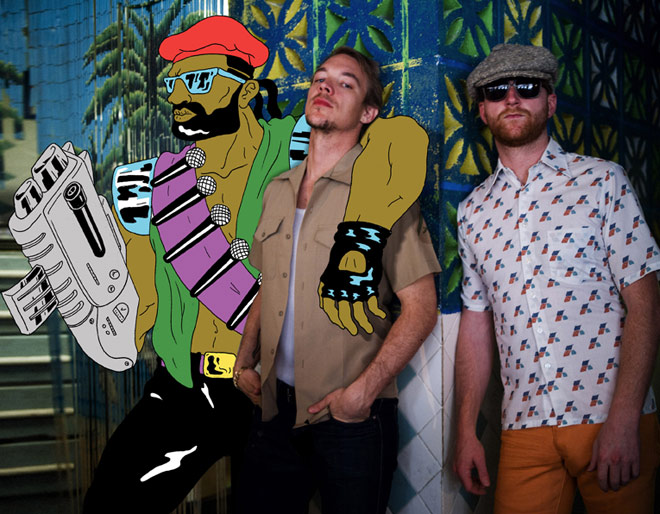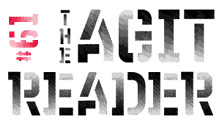
Waking Up the Dead
by Kevin J. Elliott
It’s been nearly five years since Wesley Pentz (a.k.a. Diplo) dropped his first original work, Florida, on an unsuspecting public. In that span he’s become the world’s DJ de rigueur, with a laundry list of accomplishments and credits to his name too long to expound upon here. He’s the man responsible for bringing everything from Funk Carioca and M.I.A. into the hipster lexicon. To say that his Mad Decent label is becoming a launch pad for all things current is an understatement—it’s becoming an empire. But something has been missing among the constant cycle of masterful remixes and euphoric DJ sets. More or less, Pentz has hinted that he’d rather create than import and re-contextualize all the souvenirs he’s acquired in travels. Major Lazer has filled that void. Along with his partner in beat, London producer Switch, Diplo has finally made what could be considered a proper follow up to Florida.
Of course with Diplo there’s a twist involved. In order to make Major Lazer a reality he had to enlist the help of the Major himself: a veteran guerilla of the Jamaican zombie/vampire wars and CIA hired-gun fitted with a bionic, laser-beam shooting arm. Did I mention he rides a hoverboard? This imagined mascot of the entire project is fitting, as the “digital” reggae of Guns Don’t Kill People... Lazers Do is a high-wired trip through island rhythms, toasters and selectors, old school to new school and back again, energetically lead by Major Lazer’s dancehall all-stars. Diplo and Switch promised the album of the summer, with a banger to highlight each week, and so far I’ve found no reason to doubt this claim. It holds up beyond expectations, adapting Diplo’s future-forward production to a tried and true formula mostly foreign to American audiences. Instead of picking the brains of the duo responsible for 2009’s ultimate party record, I went to the source of the madness himself. Apologies in advance for Mr. Lazer’s tongue; some of his answers might be lost in translation.
Most people have called this “dancehall” or “ragga,” “rocksteady” or “lover’s rock,” but it’s more than that now that you have arrived. How do you describe this album to the masses?
Major Lazer: Well, when mi first start work on de record, mi call it “digital reggae,” and Diplo jus ah run wid dat. So wi call it “digital reggae” right ya now.
When you were fighting in the zombie wars, did you ever imagine that you would produce a record someday?
ML: From I was a likkle yute, I used to follow sound system thing. It run in mi family. So true say mi end up inna zombie war, mi always love reggae music and dem ting. So dis record come in like a dream come true, see me.
How did the vampires become a part of this clash? And is this war still a problem or are you retired?
ML: Well you know how the saying goes, “Monsters of the night haffi hold tight,” so de vampires, zombies, werewolf, the whole ah them ah one. But mi lick off most ah hem head inna the ’80s, so the world nuh really have nutten fe worry about when it comes to the zombie dem.
It seems like you are fairly old school when it comes to the music of your homeland. Are the younger dancehall stars that you worked with familiar and indebted to Sly and Robbie, the Scientist, Peter Tosh and Lee Perry or do they feel those artists are relics, and as a result, are trying something new? I hear a little of both.
ML: You haffi know where you coming from fe know where you ah go. So de new guard dem risspeck de older heads still, but you can’t live inna de past, so we just haffi come up wit de ting fe make the music fresh and interesting when we ah tek it to di worl.
How did you decide with Diplo and Switch to pick the artists that you have on the record?
ML: We just go inna bush and burn some Al Gore and say, “Yow, who unnu feel say ah go sound nice pond is record?” and throw roun some name and ting. Diplo had the one whole heap of artist who him did waan work wit, and mi had whole heap too, so we just choose two three couple artist and rock wit dem.
I’ve been reading that dancehall is lead by a toaster. Can you give me a better definition of what a toaster does, and is it a requirement in dancehall to have a toaster?
ML: Di toaster ah di mic man. Him build the “argument,” or introduction for di chune. So if ah love song, him ah go build argument bout when yu girl did ah leave you. Him ah di man we bring vibes inna dance, and connect the people wit di music.
And the “selecter”—is that just another word for DJ? And if so, which one are you, a selecter or a toaster?
ML: Selector ah di operator inna di control tower, hit after hit, hour after hour. Selector ah di man whe “select” di chune fi de mic man go hype dem up. Mi ah one ah di wickedest selector di worl ever know. And me can build me own argument too. Man haffi versatile in dese times.
Besides the obvious Sean Paul or Shaggy singles, this type of dance music is pretty foreign to American audiences. Do you have a theory as to why it’s remained so maligned in the pop charts?
ML: More time the people them can’t really identify wit dem chune deh cause dem know Jamaica as a land of Mary Warner and Bob Marley, see me? And dem naw undastan di patois and di whole culture of dancehall, jus like hip-hop ah culture, not just ah music, see me? But dancehall music and soca music and di whole ah di Caribbean ting is a feel good ting, so if yuh waan feel good, tune een.
Do you have any favorite records that aren’t borne of Jamaica that influenced the Major Lazer sound?
ML: As yute inna Jamaica me grow up round soul music ting, den me ego inna disco ting. So everyting from Etta James and Diana Ross to Stevie Wonder and brown Michael Jackson we ah lissen.
There were a lot of artists that were initially listed to appear on the record, but don’t show up. I’m interested to know what happened, how you chose the songs and artists that you did, and if there’s a vault full of tracks you didn’t use?
ML: You know di ting sheg up, more time you waan do a ting but record label and contract clearance and rae rae rae ah go get in di way. But we ah look fi make Major Lazer record label and start turn out more and more digital reggae, ah nuh just one record and pop down, see me.
“Keep It Going Louder” is somewhat the sore thumb on the record, in that it stands out from the arching theme. But it’s pretty infectious as a single. How have you been preparing for the day when this becomes a top 40 hit?
ML: Well from me famous, me waan end up inna movie screen. Den me ah go jus cool out and relax again.
Are you aware that Ricky Blaze and Nina Sky are about to be on the level of Akon and Fergie?
ML: Me nuh really know dem ting deh. Mi know say Akon ah di yute whe jux off di young gyal down ah Trinidad. But me nuh know di man whe name Fergie.
What are your plans after the album?
ML: Mi waan sell ah million. First commando fi go platinum. Den mi waan make digital reggae get a grammy. Den mi waan go deh inna di movies. Al Pacino come check me down ah Trinidad, ah wah.
